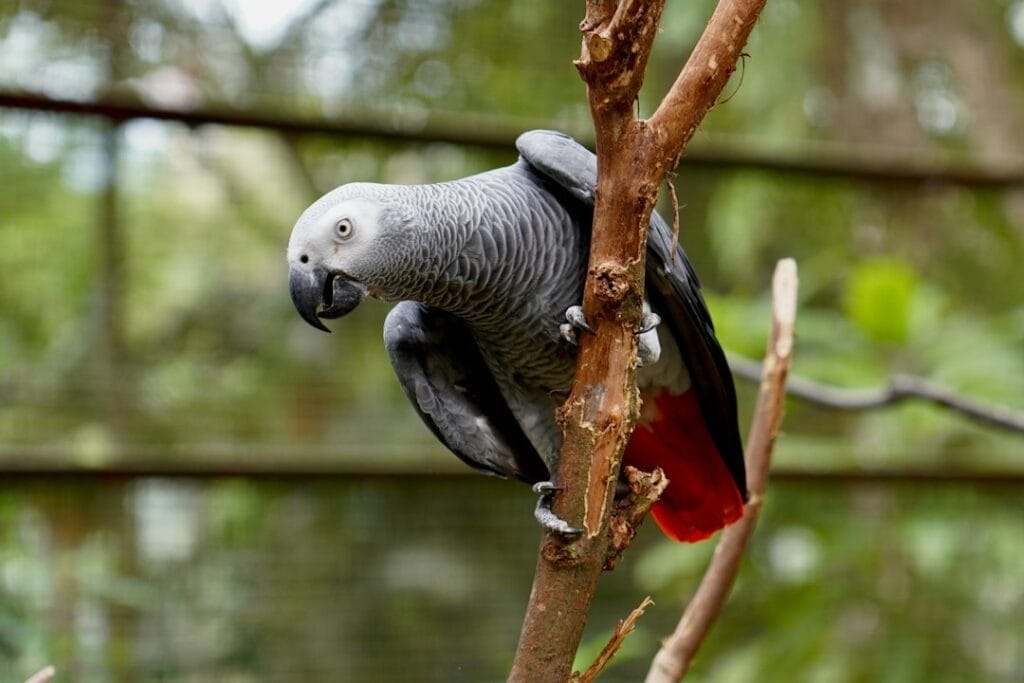Renowned for their astonishing intellect and skill in echoing our words, African Grey parrots emerge as truly captivating companions. But caring for these birds goes beyond mere entertainment; it involves understanding their complex needs. By diving into how to create a nurturing habitat, you’ll discover ways to keep your feathered friend both happy and healthy at home. We also break down the African Grey’s diet—what fuels their brilliance and what foods are off-limits—to ensure they thrive under your care.
Additionally, we delve into the typical health challenges these birds might face, sharing knowledge on warning signs to be alert for and methods to prevent them. As African Greys age gracefully alongside us, knowing what changes to expect becomes crucial in supporting them through different life stages. Finally, we weigh the joys against the challenges of having an African Grey parrot as part of your family. Throughout this journey, the guide offers hands-on tips to navigate each phase effectively.
Table Of Contents:
- Understanding the African Grey Parrot’s Habitat Needs
- The African Grey Diet: A Comprehensive Guide
- Navigating Health Issues in African Grey Parrots
- Lifespan and Aging in African Grey Parrots
- Pros and Cons of Keeping an African Grey Parrot
- Let’s Talk African Grey – Long Term
 AI illustration of an African Grey Parrot
AI illustration of an African Grey Parrot
Understanding the African Grey Parrot’s Habitat Needs
Creating a habitat for an African Grey parrot is like setting up a mini rainforest in your living room. African Greys flourish when their living spaces are bursting with chances for discovery and closely resemble the lush, vibrant ecosystems they originate from.
Space Requirements
The mantra “bigger is better” rings true when it comes to cages for African Greys. A spacious cage not only prevents boredom but also promotes physical health by allowing them enough room to spread their wings and move around freely. Think of it as providing a studio apartment rather than a cramped closet for your feathered friend.
A minimum cage size recommendation often cited is 32″x23″x64″, but if you can go larger, do it. Your feathery companion will express their gratitude through delightful melodies of happiness.
Find the cage size to make your African Grey feel at home.
Enrichment Ideas
To keep your African Grey mentally stimulated, incorporate various toys and perches at different levels within the cage. Mixing up their environment with diverse toys and perches invites instinctual activities like scaling and scavenging, which sharpens their intellect and keeps them actively involved.
Beyond just toys, spending quality time with your African Grey outside their home is essential for their happiness and health. Just remember, while they love playing copycat mimicking sounds or words they hear from you might just become part of their daily routine.
The African Grey Diet: A Comprehensive Guide
African Greys are not just any bird; they’re like the Einsteins of the avian world. This means their diet needs to be as top-notch as their intelligence. Here’s a breakdown.
Amazon carries an assortment of food for your African Grey.
Balanced Nutrition for Brain and Body
Imagine you’re building a rocket ship. You wouldn’t use subpar fuel, right? The same goes for feeding your African Grey. Their diet should mainly consist of high-quality pellets, which act like premium fuel by providing all the necessary nutrients in one package.
Yet, introducing a diverse mix of foods makes life more flavorful. Mixing in fresh fruits and veggies ensures your feathered friend doesn’t get bored and maintains optimal health. Think dark leafy greens, carrots, apples—anything bursting with vitamins but low on sugar.
Remember though, moderation is key; too much fruit can lead to weight gain because of its high sugar content.
Foods to Avoid Like Plague
Certain foods are big no-nos for these parrots—avocado tops this list due to its toxicity to birds. Chocolate and caffeine are also out since they can cause serious health issues ranging from hyperactivity to heart problems. And let’s not forget about alcohol or salty snacks; both could have deadly consequences.
If you have questions about what your African Grey Parrot can eat, you can sign up for an online vet consultation with Ask A Veterinarian. They are available 24/7 to answer questions.
To avoid unexpected health costs, check out Pet Assure Mint.
Navigating Health Issues in African Grey Parrots
African Greys are like the Einsteins of the bird world, but even geniuses can get sick. Knowing what to look out for could save your feathered friend from serious issues down the line.
Symptoms to Watch Out For
Keep an eye on their behavior. Changes might be subtle at first—a lack of appetite or a slight change in droppings—so staying vigilant is key. More alarming signs include plucking feathers, lethargy, or respiratory issues.
Spotting any of these warning signs should prompt you to seek assistance immediately. The Association of Avian Veterinarians offers resources and local vet recommendations. Getting ahead of the problem early on could significantly change the outcome.
Preventive Measures
Making sure your parrot stays healthy starts with good habits: a balanced diet, plenty of exercise, and regular check-ups with an avian vet. It’s equally vital to maintain a habitat for them that’s as pristine and similar to their wild surroundings as we can manage.
Stress reduction plays a big part too. These birds are smart and need mental stimulation; otherwise, stress-related health problems can crop up fast.
Lifespan and Aging in African Grey Parrots
African Grey parrots, celebrated for their astounding intellect and talent in echoing human words, offer companionship that could span between four to six decades. But just like humans, they experience changes as they age.
Supporting Graceful Aging
To help your feathered friend navigate its golden years gracefully, focus on nutrition optimized for senior birds. This includes lower calorie foods to prevent obesity, a common issue in less active elderly parrots. Regular veterinary check-ups are crucial too; these not only catch any budding health issues early but also provide an opportunity to adjust care routines as needed.
Environmental enrichment remains key throughout an African Grey’s life. For older birds, ensure that toys and activities do not require intense physical effort but still stimulate their keen minds.
Changes To Expect
As African Greys age, you might notice some behavioral changes or signs of cognitive aging such as reduced activity levels or confusion. Their feathers may lose some luster and plucking could become a problem if they’re stressed or bored. Engaging in soft play and interactive activities can serve as a countermeasure to these age-related challenges.
Maintaining the bond through quiet time together can reassure your bird amidst these changes while enriching both your lives.
Pros and Cons of Keeping an African Grey Parrot
Owning an African Grey parrot is like having a feathered Einstein at home. These birds are renowned for their intelligence, often showing abilities comparable to a five-year-old human child. African Grey parrots, with their ability to amass a vast vocabulary and apply it meaningfully, stand as incredibly intriguing mates.
But with great intellect comes great responsibility. African Greys need constant mental stimulation; without it, they can easily become bored and develop behavioral issues such as feather plucking or aggression. Crafting a stimulating environment filled with toys and puzzles is crucial but time-consuming.
Ensuring they’re fed properly demands meticulous planning. Parrots, unlike more low-maintenance pets that do just fine on straightforward feed, demand a diverse menu brimming with fruits, veggies, nuts, and tailored pellets for their well-being—a task that’s as gratifying as it is challenging.
African Greys have long lifespans—often reaching up to 60 years in captivity—which means adopting one is not just a long-term commitment; it’s potentially a lifelong one. This longevity allows for deep emotional bonds but also necessitates advance planning for their care throughout your life stages.
Let’s Talk African Grey – Long Term
Understanding your African grey parrot’s needs is the first step. Exploring the basics of their living space, we guided you through setting up an engaging and comfortable home for them. From space to enrichment, every detail counts.
Nutrition fuels their brilliance. Eating right is more than beneficial; it’s essential. We explored what foods keep them thriving and which ones to avoid for optimal health.
Spotting signs of illness early can save lives. We shared common health issues and preventive strategies, making sure you know how to act fast.
Aging with grace matters too. Being aware of the transformations that occur can guide you in nurturing your avian companion through each phase of their existence.
The joys of having an African grey parrot are many but so are the challenges. It takes patience, understanding, and dedication to ensure they lead happy, healthy lives by our side.

